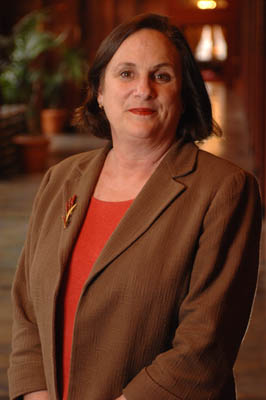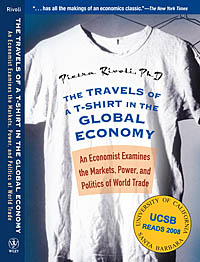Santa Barbara Readers Take On the World Economy
Reading Globally, Discussing Locally

What is globalization, anyway? Its enthusiastic proponents offer an impressive list of benefits: cheaper goods, greater individual mobility, and fewer countries in poverty, to name only three. Meanwhile, its critics can, and often do, lay just as many political, social, and economic damages at its door. For those who still don’t know what to think about it all, Georgetown business professor Pietra Rivoli has come to the rescue. Her new book, The Travels of a T-Shirt in the Global Economy, makes the issue of economic globalization accessible, enlightening, and even entertaining.
It’s for that reason that The Travels of a T-Shirt is this year’s selection for UCSB Reads, a program intended to foster discussion about the most relevant topics of our time among students, faculty, and the larger Santa Barbara community. The book has also been chosen for the Public Library’s Santa Barbara Reads! program, which hosts a series of community conversations this month in which anyone interested can learn more about the topic, whether or not they’ve read the book.

Last year, UCSB Reads was inaugurated with Elizabeth Kolbert’s Field Notes from a Catastrophe, which gave readers a first-hand look at climate change. This year, thanks to a partnership with Santa Barbara City College and with support from Patagonia, 2,000 free copies of Rivoli’s book have been distributed to UCSB students. An audio version of the book can be downloaded from the Santa Barbara Public Library’s Web site, and KCSB FM has been reading selections live on the air.
During his time as Acting University Librarian last year, UCSB Executive Vice Chancellor Gene Lucas helped shape UCSB Reads, and he remains a supporter. “It unifies the campus around a common intellectual exercise,” he wrote in an email about the program. “It provides opportunities for our faculty to go out into the community to share their knowledge and expertise.”
Of the book itself, Lucas said, “It’s a compelling read. It follows the life of a T-shirt from the cotton fields of Lubbock, Texas, to the textile industry in China to the importation, printing, and distribution in the U.S. to the recycled apparel industry in East Africa. At each leg of the journey, it discusses the industry, history, politics, culture, and economics of that leg. As such it is very multidisciplinary, and thus interesting to readers from a variety of backgrounds.”
This quarter, UCSB professor Richard Appelbaum made the book assigned reading for his 300-student introductory course to Global and International Studies, a program he cofounded. “[Travels of a T-Shirt] shows how many hands enter into such a process, and the often squalid conditions under which those hands labor,” Appelbaum said. “Without qualification, globalization is changing our world faster than ever before. Production chains now form a global factory. You might have a Korean multinational employing Mexican workers to make goods for U.S. markets that are sold right here in the UCSB bookstore.”
“A T-shirt is something everyone in the United States can identify with, and probably owns way too many of,” said Rivoli, on the phone from her office at Georgetown University’s McDonough School of Business. “Thirty years ago, the T-shirt’s story would have been largely domestic: cotton grown in Texas and spun in North Carolina, then stitching done in Alabama. Now, that story is global.” Though the term “globalization” surfaced in the 1990s, the phenomenon isn’t new. “You can go back to the Silk Road, to the Roman Empire, or to Ancient Greece and still see these international trade flows,” Rivoli said. “What’s new is the pace of change, the speed at which the borders are falling. It’s all about the disintegration of borders, allowing ideas, money, and goods to flow.”
Globalization’s detractors often invoke the concept of a “race to the bottom”-commercial competition that worsens lives in the developed and developing worlds alike for the sake of turning a profit. “It’s the idea that if consumers want cheaper T-shirts,” Rivoli explained, “the Wal-Marts of the world search the globe for the cheapest labor and material, driving down the cost of T-shirts, which causes production to move to cheaper and cheaper locations. The race to the bottom is a fact of the global economy, but the bottom itself is not fixed; it’s rising. Conditions in a textile mill 100 years ago in North Carolina look worse than those in a textile mill outside of Shanghai today, where conditions today look better than they did when I first visited in 1999. I take issue with the idea that things are spiraling toward an increasingly awful place. A day’s factory work is better than it was 10 years ago, and 10 years ago it was much better than it was a century ago. Overall, we’re looking at a story of human progress.”
Appelbaum agrees. “I do see the problems of globalization improving,” he said. “Because of the student anti-sweatshop movement, Nike stopped contracting with factories in Indonesia. Gap was also a target, so they developed a program in Cambodia to work only with unionized factories. Even China is concerned with the problems it’s creating. Last year, there were 85,000 demonstrations and protests, some violent, against China’s untrammeled growth, which of course caught the attention of the Chinese government, which wants what they call a ‘harmonious society.'”
Given the enormous scale of economic globalization, what can ordinary people do to maximize the positives and minimize the negatives? “It’s not a process over which we have no control,” responded Rivoli. “Markets operate within the rules we write, and we now need to write global rules. As citizens, there’s a lot we can do, and there’s a lot that has been done, such as the labor and environmental provisions in the latest rounds of trade agreements. Every dollar you spend is a vote, and consumers are developing an instinct to think about what their money supports. There’s certainly nothing to be lost in understanding a little bit more about where things come from, and there’s a lot to be gained.”
4•1•1
Pietra Rivoli will deliver a free lecture at UCSB’s Campbell Hall on Wednesday, March 5, at 8 p.m. Community conversations are scheduled throughout the month of February at various UCSB and Public Library locations. For more information, visit ucsbreads.library.ucsb.edu or sbplibrary.org/sbreads.



